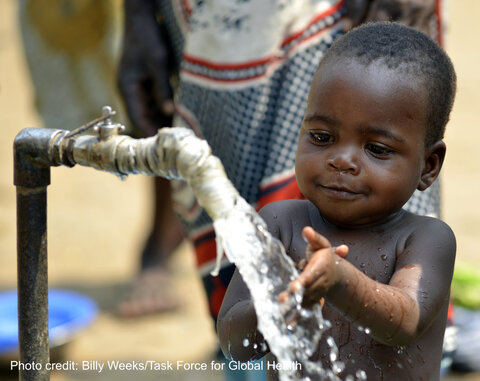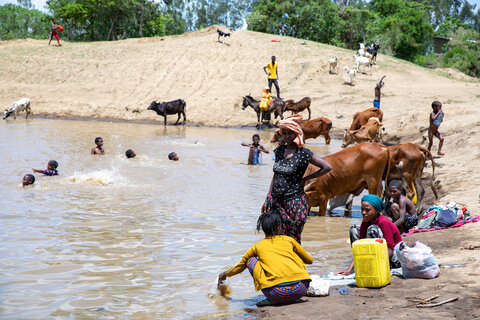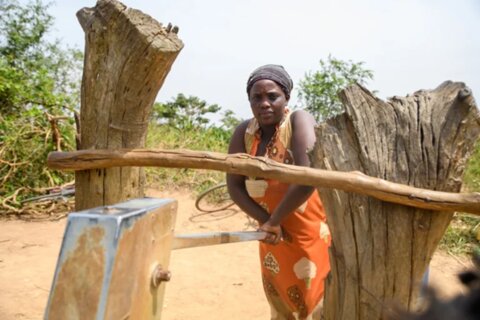Strengthening cross-sectoral collaboration to #beatNTDs: lessons from Ethiopia, Nigeria and Uganda

Neglected tropical diseases (NTDs), including trachoma, the world’s leading infectious cause of blindness, thrive in areas with limited access to water, sanitation, and hygiene (WASH). WASH interventions are essential across the full spectrum of prevention, treatment, management, and care for NTDs. However, it is estimated that 785 million people lack access to basic water services, over two billion people do not have access to basic sanitation, and three billion lack hand and face washing facilities at home.
Ending the neglect to attain the sustainable development goals: a road map for neglected tropical diseases, and its companion document, the Global WASH/NTD Strategy, emphasize that cross-sectoral collaboration is needed to achieve global targets for NTDs. In particular, deliberate and sustained collaboration and coordination between health and WASH stakeholders are essential to ensure WASH interventions are targeted at areas with high NTD burden and implemented by organizations with sufficient expertise and established and trusted relationships within communities that they serve.
In 2023, the World Health Organization and Neglected Tropical Disease NGO Network published a second edition of WASH and health working together: a ‘how-to’ guide for neglected tropical disease programmes. This WASH/NTD toolkit provides step-by-step guidance to NTD program managers and partners on how to engage and work collaboratively with the WASH community and other relevant sectors to improve the delivery of WASH services to underserved populations. The toolkit draws on tools and practices used in the delivery of coordinated and integrated programs for NTDs, with the second edition providing revisions and new tools based on experiences of using the toolkit in more than 20 countries.
Here, we present experiences from three countries, Ethiopia, Nigeria and Uganda, which have taken proactive steps to adopt the WASH/NTD toolkit to improve cross sector action. By sharing country experiences, we aim to highlight the significant advancements that countries can make by using the toolkit and promoting cross-country learning to advance global progress for WASH and NTDs.
Ethiopia

In 2017, under the leadership of the Minister of Health, Ethiopia published a national framework to guide collaboration on WASH and NTDs. The framework includes explicit reference to the WASH/NTD toolkit, providing recommendations on how the health sector can effectively collaborate with non-health partners, including WASH, education, and other government administrative structures. Central to the government’s efforts is a commitment to ensuring that WASH and NTD programs are delivered at the highest possible standard, incorporating a participatory process to ensure the efficiency and quality of programs.
To ensure effective implementation of the toolkit, the Federal Ministry of Health conducted an advocacy campaign to raise awareness about NTDs among policy makers across all relevant sectors, including WASH and education. This led to a landscape analysis and the sharing of WASH and NTD data so that WASH interventions could be targeted in communities affected by NTDs and with limited WASH access. Furthermore, with dedicated funding for WASH and NTD programs, Ethiopia established technical working committees at every administrative level, including the national, regional, zonal, and district levels. Training was cascaded to each level so that the toolkit could be tailored to each specific context, and a message guide was developed with tailored messages at all levels, including district-level political leaders, and messages for influential community members, such as teachers. Following the development of the national framework, the Federal Ministry of Health, with support from partners, created an adapted toolkit tailored to the specific needs of district planners and implementers.
“The toolkit guides all stakeholders to work more effectively together,” said Fikre Seife, National NTD Program Manager, Federal Ministry of Health. “Without the toolkit, people come to a meeting and are not guided by a structured tool and achieve less. The toolkit helps to identify district-specific situations in terms of NTD burden, financing, and water and sanitation coverage. It helps to map the most appropriate stakeholders to involve, both from the NTD side and WASH side, and determine roles and responsibilities.”
Central to Ethiopia’s success in integrating WASH into NTD efforts has been to mobilize communities to improve their own health. The district level WASH/NTD toolkit provides guidance for stakeholders to strengthen community engagement by identifying community influencers who can promote behavior change as well as identifying in-kind contributions from communities, which will contribute to sustained behavior change.
Uganda

Uganda's NTD Master Plan for 2023-2027 emphasizes the need for increased collaboration between stakeholders to improve integration between WASH and NTDs. In 2020, Uganda adopted the WASH/NTD toolkit as its main approach to collaboration. Furthermore, in 2021, Uganda became the second country to develop a national framework for WASH and NTDs, formalizing collaboration and resulting in the establishment of a steering committee and community of practice. These structures bring together representatives from the ministries of water, education, and health, as well as civil society organizations, to improve coordination and collaboration towards shared goals. Within each sector, WASH/NTD champions have been recruited, who advocate for increased coordination and collaboration across sectors and ensure momentum is maintained towards shared goals.
Specific tools within the WASH/NTD toolkit, including the situation analysis and planning tools, have enabled Uganda to determine specific gaps for WASH and NTDs, target interventions, and allocate resources more effectively. In particular, they have helped identify the specific areas where cross-sector collaboration would be most likely to make an impact and facilitated improved community engagement, essential for gaining community buy-in and ensuring the sustainability of interventions.
These activities have enabled programs to deliver two key outcomes: 1) improved health education, particularly among school-aged children who experience high levels of infection for many NTDs, including trachoma; 2) increased access to clean water and sanitation, enabling children to wash their hands and faces and reducing environmental degradation. Together with annual mass drug administration campaigns, the impact of these activities is reducing the burden of several prevalent NTDs.
Nigeria
In Nigeria, efforts to strengthen WASH and NTD coordination have been underway since 2018. Utilizing the WASH/NTD toolkit, Nigeria conducted a landscape analysis and established an inter-ministerial group comprised of representatives from the Federal Ministry of Health, the Federal Ministry of Water Resources, Sightsavers, UNICEF, National Bureau of Statistics ( NBS), and other relevant bodies.
Through this group, combined indicators were developed for trachoma, schistosomiasis, soil-transmitted helminths, lymphatic filariasis, and WASH. These indicators were presented to national stakeholders to raise awareness about the importance of WASH and NTD integration. Additionally, Nigeria developed a data-merge dashboard to display combined WASH/NTD indicators. The dashboard supports data visualization and aims to improve joint planning, resource mobilization, and other critical decision-making for WASH/NTD integration. Staff at the Federal Ministry of Health and Federal Ministry of Water Resources have been trained on dashboard data access, upload and update formats, and the frequency of updates agreed upon by the two ministries.
At the community level, Nigeria has implemented behavior change activities in four states (Jigawa, Katsina, Sokoto, and Yobe), aiming to create demand for latrine construction through engagements with Imams, soap vendors, and a radio program emphasizing the importance of handwashing, face washing, and building and using toilets.The interventions, implemented directly through community engagements, employed the approach of utilizing community stakeholders with influence within these communities to promote behavior change across them. Community dialogue sessions and compound meetings incorporated into the interventions ensured that every member of the community was carried along, leaving no one behind.
Experiences from Ethiopia, Nigeria and Uganda highlight the importance of collaboration at all administrative units. In all countries, political will at the national level enabled collaboration and coordination across sectors at all levels, which, in turn, facilitated community engagement and improved the sustainability of interventions. The WASH/NTD toolkit provides a resource to facilitate this coordination, with a variety of tools available for all countries, irrespective of their financial capacity to fund joint programs or the level of existing collaboration within the country. The resource is also supported by the NNN WASH Working Group that is available to provide tailored technical assistance to countries to contextualize the toolkit and maximize the benefit of the resource.